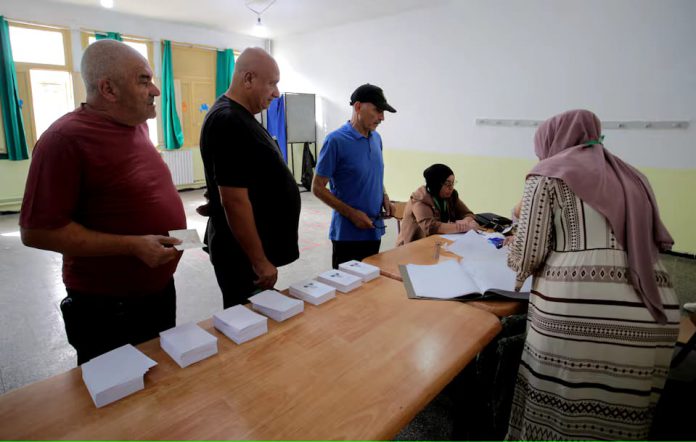Algerian authorities on Sunday declared President Abdulmadjid Tebboune the winner of Saturday’s election.
However, a rival candidate alleged irregularities in the count and fewer than half of registered voters cast ballots.
Official preliminary results gave Tebboune 95% of the vote, enough to avoid a second-round run-off, with Abdelaali Hassani Cherif getting 3% and Youcef Aouchiche 2%. Turnout was 48%.
Tebboune, backed by the military, was facing only nominal opposition from Hassani Cherif, a moderate Islamist, and Aouchiche, a moderate secularist, both running with the blessing of Algeria’s powerful establishment.
Hassani Cherif’s campaign said polling station officials had been pressured to inflate results and alleged failures to deliver vote-sorting records to candidates’ representatives, as well as instances of proxy group voting.
“This is a farce,” said Hassani Cherif’s spokesperson Ahmed Sadok, adding that the candidate had won far more votes than had been announced, citing the campaign’s own tallies from regions.
Reuters could not immediately verify those tallies or reach Tebboune’s or Aouchiche’s campaign for comment.
However, electoral commission head Mohammed Charfi said when announcing the results that the body had worked to ensure transparency and fair competition among all candidates.
Late on Sunday, three presidential candidates, including Tebboune and Cherif, issued a joint statement in which they objected to the provisional results announced by the electoral commission.
“We inform public opinion of the ambiguity, contradiction, vagueness and conflicting numbers recorded with the announcement of the provisional results of the presidential elections,” the joint statement said.
Tebboune’s re-election means Algeria will likely keep on with a governing programme that has resumed lavish social spending based on increased energy revenues after he came into office in 2019 following a period of lower oil prices.
He has promised to raise unemployment benefits, pensions and public housing programmes, all of which he increased during his first term as president.
“As long as Tebboune continues to raise wages and pensions and maintain subsidies he will be the best in my eyes,” said Ali, a cafe customer in the Ouled Fayet district of Algiers, asking not to write his family name.
First elected during the mass “hirak” (movement) protests that forced his veteran predecessor Abdulaziz Bouteflika from power after 20 years, Tebboune has backed a tough approach from the security forces, which have jailed prominent dissidents..











